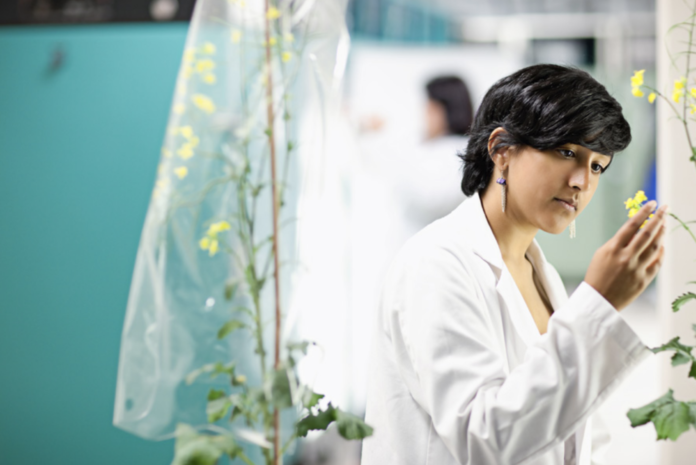
Located in Canada’s heartland, Saskatchewan has created a longstanding tradition of innovation in agriculture and new ways of thinking about bio-resources.
Saskatchewan’s agricultural wealth and diversity make a natural environment not only for production technologies in plant breeding, inoculants and agricultural data applications, but also for the development of functional foods, nutraceuticals, health products, vaccines and feed technologies.
The province is recognized as a world leader in agricultural biotechnology and life sciences, and is home to some of the strongest industry clusters and advanced research and development facilities in Canada. Saskatchewan has a thriving, multi- billion-dollar agri-food industry, supported by a competitive tax environment and easy access to domestic and offshore markets.
Today, these competitive advantages are making Saskatchewan an attractive place to do business, regardless of industry, and national and international players alike are taking note.
Preparing to Feed a Growing Population
Saskatchewan is uniquely positioned to lead the world’s efforts in addressing the issue of food insecurity caused by a rising global population.
Researchers at the Global Institute for Food Security, located at the University of Saskatchewan in Saskatoon, are preparing to feed our growing population by breeding stronger and more resilient plants. The focus is on developing new technologies that enhance the quality of seeds and make them more robust and resilient to insects, thereby improving the value of seeds to farmers and producers. Research is also aimed at finding more efficient ways to study and image roots and the soil that surrounds them so they can contribute to improving crops and developing new crop varieties that are more resilient and adaptable to marginal soils.
Advances in crop resiliency will not only increase yields across the prairies, but will improve crops on a global scale – for example, helping countries in Africa that grow maize and sorghum.
Saskatchewan’s collaborative approach to crop development research will play an increasingly vital role in positioning the province as the world’s leading supplier of high-quality food and ingredients.
Currently, Saskatchewan accounts for over 40% of Canada’s arable farmland – with 33 million of the 60 million acres of agricultural land being used for crop production each year.
Protecting Canadians with Locally Manufactured Vaccines
Saskatoon, Saskatchewan – home to one of the world’s largest and most advanced containment level 3 facilities – will soon be able to manufacture human and animal vaccines for some of our planet’s most serious disease-causing microbes.
The Vaccine and Infectious Disease Organization – International Vaccine Centre (VIDO-InterVac) plans to open the $8.1-million manufacturing facility in 2020. The new facility will help Canada’s vaccine technologies enter the market quicker. It will reduce Canada’s reliance on other nations to supply certain vaccines and has the potential to supply vaccines should an international outbreak occur.
For academia, government, companies and organizations like VIDO-InterVac, having the ability to pair basic and applied research with manufacturing will help drive innovations to the market. This will ultimately protect human and animal health. Similar to VIDO-InterVac’s containment infrastructure, the manufacturing facility will be accessible for external users.
Since its inception, VIDO-InterVac – a global leader in the development of vaccines and immunity- enhancing technologies – has created eight commercial vaccines, six of which are world firsts.Located on the University of Saskatchewan campus the organization conducts over 150 infectious disease and vaccine studies annually with a team of over 45 PhD-level scientists and offers a wide range of services to its industry partners. The new manufacturing facility take the services that VIDO-InterVac can offer even further down the commercialization pathway.
Plant Proteins: A Safe, Nutritious and Sustainable Food Source
Global demand for plant-based proteins is on the rise, creating unique opportunities for ‘protein innovators’ across Western Canada to add new value to our crops.
Protein Industries Canada (PIC) is an industry-led alliance of over 120 private-sector companies, academic institutions and other stakeholders across the country, whose aim is to increase Canada’s share of the plant-based proteins market. The growth will be accomplished by capitalizing on the full potential of prairie crops, beginning with pulses and canola, and eventually moving to other crops. Through processing and the development of food and feed products, we will generate more value from our commodities.
The pan-prairie ‘supercluster’ will utilize $152 million in innovation funding from the federal government, augmented with $280 million of industry funding and in-kind contributions as well as a $150-million venture capital fund to invest in startups and established businesses alike that are adding value to raw material, specifically in the creation of plant-based protein products.
An independent study shows that this initiative will generate around $700 million in new commercial activity and billions in incremental GDP over the next five years, and create approximately 4,700 new jobs.
Plant-based protein products are a unique opportunity, and Western Canada is now well positioned to take advantage.
By attracting local and international investments, Saskatchewan is able to further its research and development practices in the area of life sciences, resulting in an enhanced quality of life for all.
For more information visit saskatchewan.ca/invest











